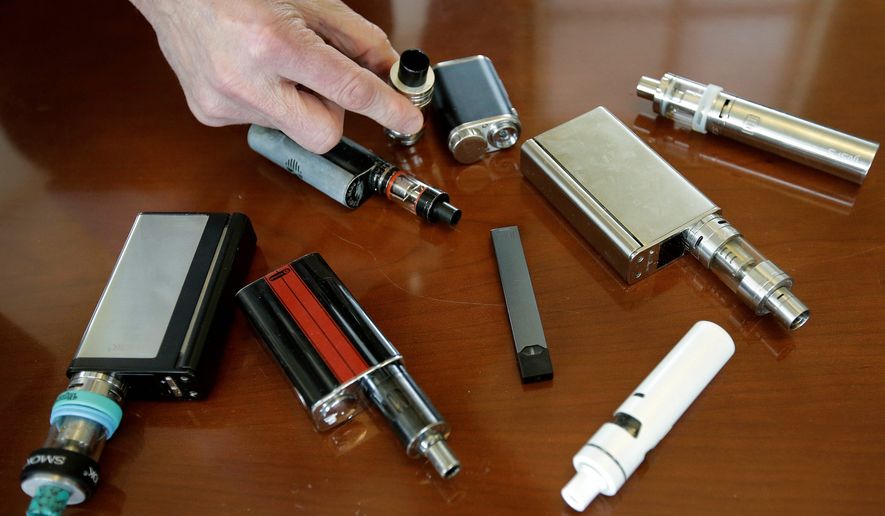OPINION:
Nearly a year ago, the Food and Drug Administration issued a major statement on “electronic nicotine delivery systems” (ENDS) — better known as e-cigarettes — accompanied by a speech from former Commissioner Scott Gottlieb declaring that there was an urgent need to address an “epidemic” of teenage use of flavored, cartridge-based products.
After a summit with the five leading e-cigarette sellers, Juul, Altria, Reynolds, JTI/Logic and Fontem/Blu), each of the companies issued statements announcing steps to address the FDA’s concerns.
Most notably, Juul and Altria promised to end sales of all “flavored” pods, and only sell products that mirror “currently available for combustible cigarettes and tobacco and menthol-based products,” including tobacco, menthol and mint-flavored pods.
Juul, which recently made a $12.8 billion deal with tobacco giant Altria, was widely seen to have been a major beneficiary of the FDA’s decision not to ban the mint-flavored version, which has never been part of the traditional tobacco control lexicon, nor has it ever been considered a “traditional” smoking flavor.
Juul CEO Kevin Burns has spoken out against the sale of e-cigarette flavors that “mimic candies or children’s foods,” yet the company is still introducing new flavors around the world, and plans to expand even more internationally.
This blatant manipulation by Juul and Altria immediately raised eyebrows, and even more surprisingly, the FDA embraced the ideology that mint-flavored e-cigarettes are in fact acceptable for the U.S. market. But even Juul’s own website describes the mint pods as offering “crisp peppermint flavor,” while the menthol version is “traditional menthol flavor with a brisk finish.”
This all raises the question — if the mint pods were marketed as “candy cane” or “peppermint patty,” as customers have described them, would the FDA have allowed their continued sale?
In plain English, in what world is “mint” not a flavor?
We should want a marketplace where all players compete under equal rules. It is good public policy that we aim to keep e-cigarettes out of the hands of minors. That mission is advanced by having a set of guidelines that are fair to all retailers, not one that fundamentally favors some at the expense of others.
With mint e-cigarettes representing 70% of Juul’s sales at the beginning of 2019, company officials are putting their own profits over the health and safety of our country’s youth. Since Juul is one of the only companies in the market offering a mint-flavored product, it is undoubtedly sees the FDA’s plan as a defense barrier to protect its market lead.
If the goal is to reduce youth e-cigarette use, and the FDA truly believes (as they have stated) that Juul bears a lot of the responsibility for the problem, why is mint now being allowed as the only flavor option?
FDA regulators have good intentions, but they are being misguided and manipulated by hypocritical tobacco companies seeking to preserve their profit margins at the cost of a higher risk for American teenagers.
The flavor ban will create a huge hole in the marketplace and lead to a massive surge of phony counterfeit products and higher youth usage rates, results which is already starting to play out.
It is highly likely that banning flavored e-cigarette products could prompt former smokers to return to tobacco cigarettes. A 2017 study by the National Bureau of Economic Research concluded that banning flavors “would result in the increased choice of combustible cigarettes.”
A full restriction on e-cigarette flavors has the potential to harm American adult former smokers who have finally quit combustible cigarettes by forcing them to return to old dangerous habits.
On Sept. 4, 2019, Michigan placed a ban on all flavors of e-cigarettes, including mint. States like Michigan understand that the ban should not exclude any flavor. If the FDA truly wants to ban flavored e-cigarettes, it should follow Michigan’s example.
We all have the same goal: Keep our country’s youth safe and healthy. But the dominant e-cigarette players, Altria and Juul, are prioritizing their own profits over the American teenagers’ health.
• Matt Mackowiak is president of Austin, Texas, and Washington, D.C.-based Potomac Strategy Group. He’s a Republican consultant, a Bush administration and Bush-Cheney reelection campaign veteran and former press secretary to two U.S. senators.




Please read our comment policy before commenting.